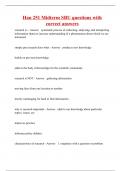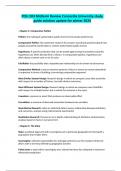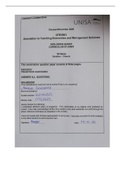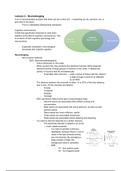Onderzoeksontwerp in de
criminologie
Daphné De Loof
3de bachelor criminologie 2022-2023
1
,2
,Prof. Dr. Colman
Les 1: Benaderingen van wetenschappelijk onderzoek
1.1 Inhoud van de les
→ Wat is goede wetenschap en hoe doe je dat?
→ Waar ligt de grens tussen (goede) wetenschap en pseudowetenschap?
1.2 Wat is wetenschap?
○ Streven naar kennis en theorievorming
○ Empirisch, gebaseerd op waarneming
○ Systematische benadering met methodologische kenmerken vb. repliceerbaarheid
○ Cumulatief
Verschillende wetenschapsgebieden: natuurwetenschappen, gezondheidswetenschappen,
sociale wetenschappen, humane wetenschappen, …
→ Geen overeenstemming over de manier waarop onderzoek wordt gedaan
→ Verschillen op vlak van:
- Wetenschappelijke benaderingen/paradigma’s: hoe kijk je naar de
sociale werkelijkheid, welke bril zet je op?
vb. eend – konijn → beide zijn juist maar andere zienswijze
- Fundamenteel onderzoek vs. praktijkgericht onderzoek
1.3 Ontologie en epistemologie
De wetenschapsfilosofie is nauw verband met:
1) Ontologie of zijnsleer – hoe of wat is het?
= “Hoe is de sociale werkelijkheid opgebouwd?”
➔ Objectivistische ontologie: sociale werkelijkheid die niet verandert (passieve actoren)
➔ Constructivistische ontologie: door interactie tussen actoren is de sociale
werkelijkheid altijd in beweging
3
, 2) Epistemologie of kennisleer – hoe is het te kennen
= “Hoe kunnen we kennis over die sociale werkelijkheid opdoen?”
➔ Positivistische epistemologie: passief bestuderen aan de hand van exacte wetenschap,
statistiek, kwantitatieve methoden, …
➔ Interpretatieve epistemologie: constante observatie want men is continu in interactie,
via kwalitatieve methoden
⇒ Het antwoord op deze keuzes zijn bepalend voor de rest van je onderzoek
1.4 Wetenschappelijke beginselen
De wetenschap vertaalt zich in twee beginselen:
Reductie: verklaren door te verwijzen naar onderliggende processen en structuren
analyse van afzonderlijke bestanddelen
→ we hebben componenten (vb. leeftijd, voorkomen) nodig om de werkelijkheid te bestuderen
vb. chemisch gedrag verklaren door opdeling in chemische elementen
Unificatie: één maken, alle theoretische kennis wordt in 1 overkoepelende theorie gegoten
→ een geheel maken van alle componenten en kleine observaties
1.5 Wetenschappelijke werkwijzen
Deductieve methode
= men vertrekt vanuit algemene axioma’s en prémisses om daar logische gevolgen en
conclusies uit te trekken (sluit aan bij positivisme en objectivisme)
vb. alle mensen zijn sterfelijk
ik ben een mens → ik ben sterfelijk
4





